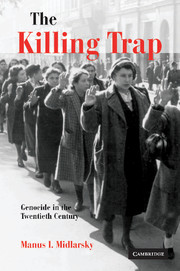Book contents
- Frontmatter
- Contents
- Preface
- PART I Introduction
- PART II Explaining perpetrators: theoretical foundations
- PART III The theory applied
- 6 Threat of numbers, realpolitik, and ethnic cleansing
- 7 Realpolitik and loss
- 8 The need for unity and altruistic punishment
- 9 Perpetrating states
- PART IV Victim vulnerability: explaining magnitude and manner of dying
- PART V Exceptions
- PART VI Conclusion
- References
- Index
8 - The need for unity and altruistic punishment
Published online by Cambridge University Press: 22 September 2009
- Frontmatter
- Contents
- Preface
- PART I Introduction
- PART II Explaining perpetrators: theoretical foundations
- PART III The theory applied
- 6 Threat of numbers, realpolitik, and ethnic cleansing
- 7 Realpolitik and loss
- 8 The need for unity and altruistic punishment
- 9 Perpetrating states
- PART IV Victim vulnerability: explaining magnitude and manner of dying
- PART V Exceptions
- PART VI Conclusion
- References
- Index
Summary
Let us now explore an additional consequence of loss. The taking on of risk as a result of loss implies potential sacrifice among significant elements of the population. Such processes typically occur at the societal level.
Turning to the societal context, as already noted in chapter 5, if there is a single question that penetrates to the heart of analyses undertaken here, it is this: “For historians of the Holocaust, the greatest challenge has not been making sense of Hitler, but rather understanding why so many followed him down his murderous path” and sacrificed their own lives in the process. Hitler himself, as other genocidal leaders, could have been seen as a political crank and marginalized, even ignored altogether. Explaining why he enjoyed such a large following is one of the principal tasks of this book.
Without that following, two things could have happened. First, the German war effort might have faltered much earlier, as soon as the German army encountered serious resistance in the East, saving many hundreds of thousands if not millions of Jewish lives. Such a precipitous collapse, indeed, occurred during World War I even with the German army intact and occupying large swaths of European territory. Significant military and civilian sectors simply refused to continue the fighting. Second, the SS and units of the Wehrmacht on the Eastern front might have been less willing to participate in the mass murder, especially as the war increasingly appeared to be a lost cause.
Information
- Type
- Chapter
- Information
- The Killing TrapGenocide in the Twentieth Century, pp. 169 - 193Publisher: Cambridge University PressPrint publication year: 2005
